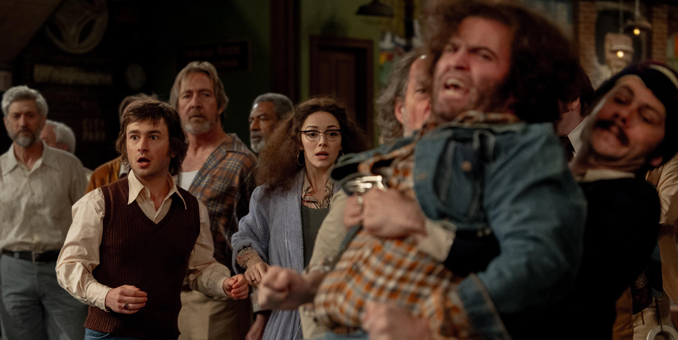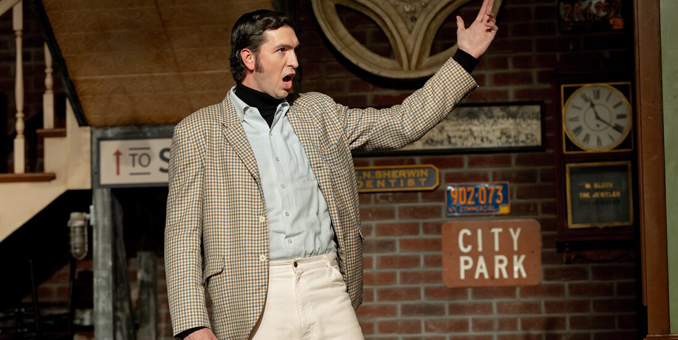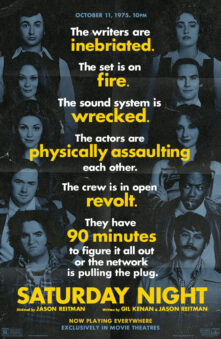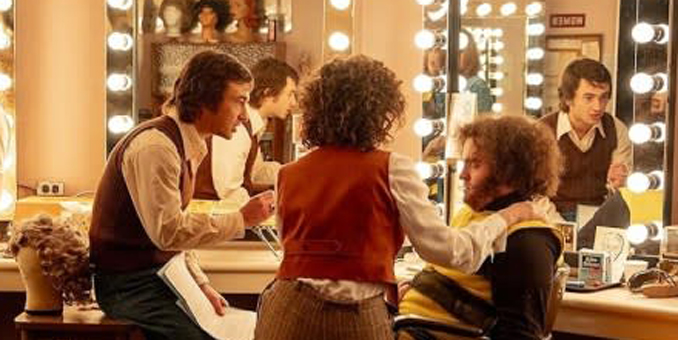
SPOILER WARNING: This article will discuss plot elements from Saturday Night and other films.
About halfway through Saturday Night, Jason Reitman’s film retelling the ninety minutes leading up to the first episode of Saturday Night Live, we get a scene where Chevy Chase (Cory Michael Smith) is being interviewed by a gaggle of reporters in the dressing room as John Belushi (Matt Wood) glowers at him from the other side of the room. Chase keeps throwing thinly veiled insults at Belushi in his answers to the reporters’ questions.
Belushi, in a foul humor to begin with, is in no mood for Chase’s insults. He lets the first few go by, but Chase pushes it a bit too far. Belushi launches himself through the crowd of reporters, grabs Chase, and slams him into the dressing room mirror behind him. People pull the pair apart before it goes much farther
“Wow! Exciting!” you think. The scene stays with you, and you decide to find out more about the altercation. You type “Chevy Chase John Belushi fight” into Google and only get results for their rivalry, but nothing on the dressing room dust up. You happen to have a subscription for Newspapers.com, so you look up what any of those reporters present had to say about the donnybrook. Once again, you find nothing.
What’s the deal? Did NBC pay the newspapers to squash the story? Did the reporters’ editors think a fight between two stars of a new TV show wasn’t newsworthy? Did Chase and or Belushi ask the reporters not to write about the fight because they didn’t want the show to get bad publicity?
The answer is “none of the above.” The reason why you can’t find any news articles about this dust up is because it never happened. John Belushi never attacked Chevy Chase in a dressing room minutes before the first Saturday Night Live went on the air. He didn’t fight him any other time either. He goaded Bill Murray into getting in a fistfight with Chase during the second season of the show, but he didn’t do any of the punching itself. But it is presented as fact in Saturday Night and that illustrates what is wrong with the movie itself in particular and on films based on true stories in general.
Any savvy moviegoer knows that when you go to theaters to see a biopic of historical drama, you are getting facts filtered through the filmmaker’s creative vision. Facts matter less than drama, and the films play fast and loose with the subject’s history to make what they think will be a more interesting movie.
Despite what The Sound of Music says, the Von Trapp family escaped Austria via a train to Italy, not transversing the Alps to Switzerland. Forget all the hallucinations in A Beautiful Mind, John Nash only heard voices during his battle with paranoid schizophrenia. And while The Imitation Game had Alan Turning being blackmailed by a Soviet double agent on his team, in reality, the two likely never met except in passing.
I could go on. Every film “Based on a true story” has these deliberate inaccuracies in them to heighten the drama. Some have a lot of fibbing, others only minor changes, but almost all present a version of events than differ from what happened in real life.

So, why am I calling out Saturday Night? Because it baked veracity into its marketing and its narrative. Like I mentioned above, Saturday Night claims to be a detailing of the hour and a half before the first episode of the show went on air. The film keeps track of the time to it going live on screen. The audience is constantly reminded of what time the events on screen are happening, and how close it is to the start of the show. You are drawn in by the tension it creates and are worried about how they will deal all the problems as they arise.
However, when you find out that some of the problems that Michaels and company face didn’t really happen the way the film says it did, the film loses a lot of its impact, and your suspension of disbelief needs to be higher to enjoy the film.
The film had a couple strikes against it before it even hit theaters. There are few TV shows that had more written about it than Saturday Night Live. There have been countless blogs and books written about SNL, notably the books Saturday Night: A Backstage History of Saturday Night Live by Doug Hill and Jeff Weingrad and Live From New York: An Uncensored History of Saturday Night Live by Tom Shales and James Andrew Miller. Not many people knew who John Nash or The Von Trapp family were when their movies came out, but if you are an SNL fan, you are well-versed in the origins of the show. The behind -the-scenes stories had codified into legend, so you know when then the stories were changed.

I started to find discrepancies between fact and fiction as early as the Teaser Trailer and the first poster. As you can see on the left, the poster goes through a list of what happened during this time period. The writers being stoned was legendary, and stories of the pot use on the 17th floor was recalled in both those books above. Everything else? Never appeared in anything I had read except the actors physically assaulting each other, which as I mentioned above happened in Season Two, not before the first episode.
You can find many websites listing the inaccuracies in Saturday Night, including People, USA Today and The Wrap. These articles only scratch the surface at the liberties the film takes with the facts. My favorite discrepancy is Al Franken (Taylor Grey) and Tom Davis (Mccabe Gregg) pitching their legendary Bleeding Julia Child sketch to Lorne Michaels (Gabriel LaBelle) not only three years before it aired, but also three years before the incident that inspired it (Franken and Davis were inspired by Child cutting the tip of her finger off before a segment on The Tomorrow Show with Tom Snyder in 1978).
Reitman and co-writer Gil Kenan playing fast and loose with SNL history turns the film into an unreliable narrator. When plot points arise that are not well known in the real world, how are we to know if they happened in real life or are just fabricated? Did Milton Berle really expose himself in front of Chevy Chase and his fiancée backstage? (No, he didn’t) Did Lorne Michaels originally plan to have himself host Weekend Update but decided to turn it over to Chase at the last minute? (Yes, but he made the switch weeks prior, not minutes before show time as the film states.)

The reason why events were added, switched around or changed was to make a more interesting movie. This brings a big question I have about these films. If the real events are not interesting enough to stand on their own, why make a movie at all? I know that real life doesn’t always fit into the three-act structure. But you should be able to make a pretty good movie out of the 90 minutes before Saturday Night Live went on the air without having to bend the truth.
But Hollywood and critics do not seem to care. Films like A Beautiful Mind and Bohemian Rhapsody earned Oscars. Saturday Night has gotten some good reviews. Audiences might have a different view, as Saturday Night didn’t do well at the box office. Maybe audiences prefer the real story instead of film only based on them. Maybe, like me, they find inaccurate real stories uncomfortable and irritating to watch. But even with bad box office, the trend is unlikely to change.



